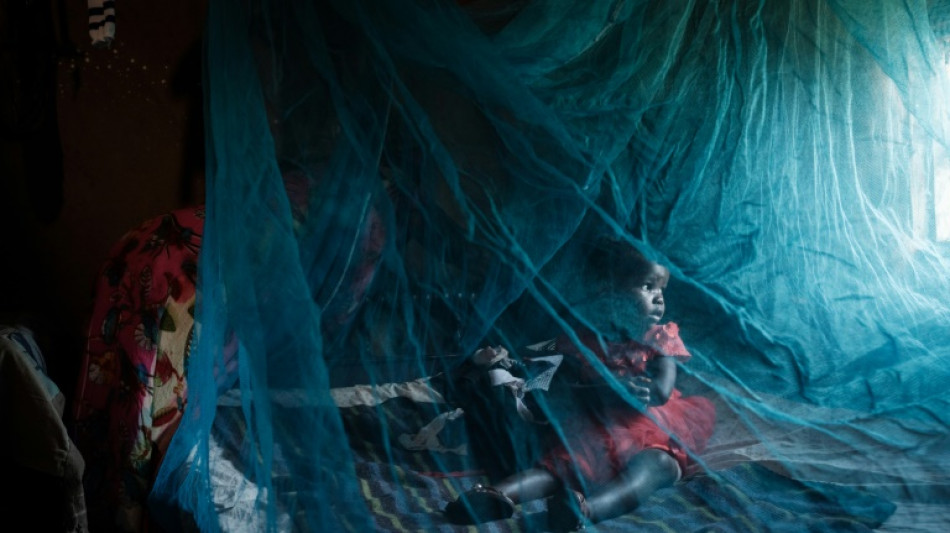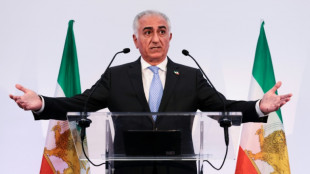
-
 Japan PM calls snap election on Feb 8 to seek stronger mandate
Japan PM calls snap election on Feb 8 to seek stronger mandate
-
Europe readying steps against Trump tariff 'blackmail' on Greenland: Berlin

-
 What is the EU's anti-coercion 'bazooka' it could use against US?
What is the EU's anti-coercion 'bazooka' it could use against US?
-
Infantino condemns Senegal for 'unacceptable scenes' in AFCON final

-
 Gold, silver hit peaks and stocks sink on new US-EU trade fears
Gold, silver hit peaks and stocks sink on new US-EU trade fears
-
Trailblazer Eala exits Australian Open after 'overwhelming' scenes

-
 Warhorse Wawrinka stays alive at farewell Australian Open
Warhorse Wawrinka stays alive at farewell Australian Open
-
Bangladesh face deadline over refusal to play World Cup matches in India

-
 High-speed train collision in Spain kills 39, injures dozens
High-speed train collision in Spain kills 39, injures dozens
-
Gold, silver hit peaks and stocks struggle on new US-EU trade fears

-
 Auger-Aliassime retires in Melbourne heat with cramp
Auger-Aliassime retires in Melbourne heat with cramp
-
Melbourne home hope De Minaur 'not just making up the numbers'

-
 Risking death, Indians mess with the bull at annual festival
Risking death, Indians mess with the bull at annual festival
-
Ghana's mentally ill trapped between prayer and care

-
 UK, France mull social media bans for youth as debate rages
UK, France mull social media bans for youth as debate rages
-
Japan PM to call snap election seeking stronger mandate

-
 Switzerland's Ruegg sprints to second Tour Down Under title
Switzerland's Ruegg sprints to second Tour Down Under title
-
China's Buddha artisans carve out a living from dying trade

-
 Stroking egos key for Arbeloa as Real Madrid host Monaco
Stroking egos key for Arbeloa as Real Madrid host Monaco
-
'I never felt like a world-class coach', says Jurgen Klopp

-
 Ruthless Anisimova races into Australian Open round two
Ruthless Anisimova races into Australian Open round two
-
Australia rest Cummins, Hazlewood, Maxwell for Pakistan T20 series

-
 South Korea, Italy agree to deepen AI, defence cooperation
South Korea, Italy agree to deepen AI, defence cooperation
-
Vietnam begins Communist Party congress to pick leaders

-
 China's 2025 economic growth among slowest in decades
China's 2025 economic growth among slowest in decades
-
Gauff, Medvedev through in Australia as Djokovic begins record Slam quest

-
 Who said what at 2025 Africa Cup of Nations
Who said what at 2025 Africa Cup of Nations
-
Grizzlies win in London as heckler interrupts US anthem

-
 Three-time finalist Medvedev grinds into Australian Open round two
Three-time finalist Medvedev grinds into Australian Open round two
-
Auger-Aliassime retires from Melbourne first round with cramp

-
 Rams fend off Bears comeback as Patriots advance in NFL playoffs
Rams fend off Bears comeback as Patriots advance in NFL playoffs
-
Thousands march in US to back Iranian anti-government protesters

-
 Gotterup charges to Sony Open victory in Hawaii
Gotterup charges to Sony Open victory in Hawaii
-
Gold, silver hit records and stocks fall as Trump fans trade fears

-
 Auger-Aliassime retires injured from Melbourne first round
Auger-Aliassime retires injured from Melbourne first round
-
Gauff through, Auger-Aliassime retires as Djokovic begins record quest

-
 China says economy grew 5% last year, among slowest in decades
China says economy grew 5% last year, among slowest in decades
-
Young star Zheng may have to give back Australian Open prize money

-
 Gauff overcomes wobble in winning start to Melbourne title bid
Gauff overcomes wobble in winning start to Melbourne title bid
-
Harry set for final courtroom battle against UK media

-
 'It wasn't clean': Mother mourns son killed in US Maduro assault
'It wasn't clean': Mother mourns son killed in US Maduro assault
-
Louvre heist probe: What we know

-
 Surging billionaire wealth a political threat, Oxfam warns as Davos opens
Surging billionaire wealth a political threat, Oxfam warns as Davos opens
-
Morocco fans stunned, disappointed as Senegal win Africa title

-
 Senegal fuelled by 'injustice' in AFCON final triumph, says hero Gueye
Senegal fuelled by 'injustice' in AFCON final triumph, says hero Gueye
-
Morocco coach Regragui laments 'shameful' scenes in AFCON final defeat

-
 Maye, Boutte wonder-catch carry Patriots past Texans
Maye, Boutte wonder-catch carry Patriots past Texans
-
Train collision in Spain kills 21, injures dozens

-
 Brazilians Abner, Endrick help Lyon climb to 4th in Ligue 1
Brazilians Abner, Endrick help Lyon climb to 4th in Ligue 1
-
Barca beaten at Real Sociedad as Liga title race tightens


Urban mosquito sparks malaria surge in East Africa
The spread of a mosquito in East Africa that thrives in urban areas and is immune to insecticide is fuelling a surge in malaria that could reverse decades of progress against the disease, experts say.
Africa accounted for about 95 percent of the 249 million malaria cases and 608,000 deaths worldwide in 2022, according to the most recent data from the World Health Organization (WHO), which said children under five accounted for 80 percent of deaths in the region.
But the emergence of an invasive species of mosquito on the continent could massively increase those numbers.
Anopheles stephensi is native to parts of South Asia and the Middle East but was spotted for the first time in the tiny Horn of Africa state of Djibouti in 2012.
Djibouti had all but eradicated malaria only to see it make a slow but steady return over the following years, hitting more than 70,000 cases in 2020.
Then stephensi arrived in neighbouring Ethiopia and WHO says it is key to an "unprecedented surge", from 4.1 million malaria cases and 527 deaths last year to 7.3 million cases and 1,157 deaths between January 1 and October 20, 2024.
Unlike other species which are seasonal and prefer rural areas, stephensi thrives year-round in urban settings, breeding in man-made water storage tanks, roof gutters or even air conditioning units.
It appears to be highly resistant to insecticides, and bites earlier in the evening than other carriers. That means bed nets -- up to now the prime weapon against malaria -- may be much less effective.
"The invasion and spread of Anopheles stephensi has the potential to change the malaria landscape in Africa and reverse decades of progress we've made towards malaria control," Meera Venkatesan, malaria division chief for USAID, told AFP.
- 'More research is needed' -
The fear is that stephensi will infest dense cities like Mombasa on Kenya's Indian Ocean coast and Sudan's capital Khartoum, with one 2020 study warning it could eventually reach 126 million city-dwellers across Africa.
Only last month, Egypt was declared malaria-free by WHO after a century-long battle against the disease -- a status that could be threatened by stephensi's arrival.
Much remains unknown, however.
Stephensi was confirmed as present in Kenya in late 2022, but has so far stayed in hotter, dryer areas without reaching the high-altitude capital, Nairobi.
"We don't yet fully understand the biology and behaviour of this mosquito," Charles Mbogo, president of the Pan-African Mosquito Control Association, told AFP.
"Possibly it is climate-driven and requires high temperatures, but much more research is needed."
He called for increased funding for capturing and testing mosquitos, and for educating the public on prevention measures such as covering water receptacles.
- Multiplying threats -
The spread of stephensi could dovetail with other worrying trends, including increased evidence of drug resistant malaria recorded in Uganda, Rwanda, Tanzania and Eritrea.
"The arrival of resistance is imminent," said Dorothy Achu, WHO's head of tropical and vector-borne diseases in Africa.
WHO is working with countries to diversify treatment programmes to delay resistance, she said.
A new malaria variant is also evading tests used to diagnose the disease.
"The increased transmission that stephensi is driving could potentially help accelerate the spread of other threats, such as drug resistance or another mutation in the parasite that leads it to be less detectable by our most widely-used diagnostics," said Venkatesan at USAID.
Another added challenge is the lack of coordination between African governments.
Achu said WHO is working on "a more continental approach".
But Mbogo in Kenya said "more political will" was needed.
"We share information as scientists with colleagues in neighbouring countries," he said"But we need to reach the higher level. We need cross-border collaborations, data-sharing."
T.Ziegler--VB



